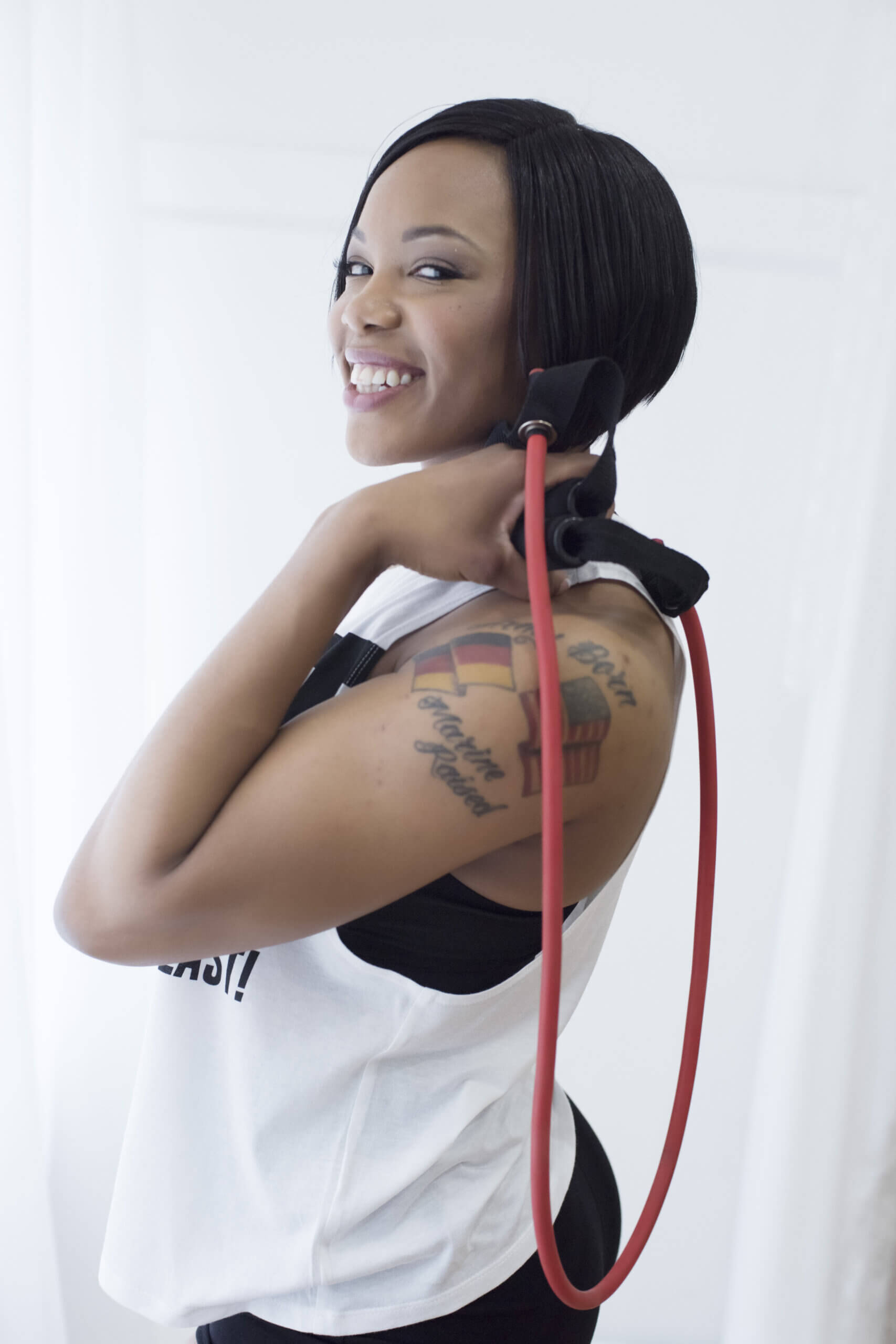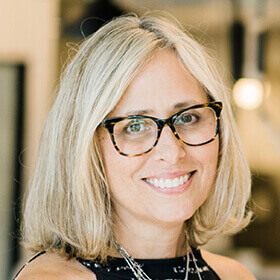Tomesha Campbell, owner of A Fitness Mindset, had an eye-opening experience when she was in the Marines, serving in Afghanistan, Botswana, and Germany.
She had grown up in New Jersey, but her time overseas made her realize how difficult it could be to maintain good nutrition in some parts of the world. “I was just not aware of the disparities around the world, especially the misinformation when it came to health and nutrition,” she says.
Growing up, food was always available and accessible. But that was not the case in the places where she was stationed.
On top of that, she realized the mindset of some of her mostly male fellow soldiers was single minded. “In the Marine Corps, it’s very bro-like. It’s all about the supplements—all about working out. And then when you start really seeing what these things do to your body, it was just a little bit more awareness of, Oh, there’s a little bit more to health and nutrition than being ‘fit’ and looking a certain way. So I started becoming more interested in a holistic form of health.”
Growing up in a big family, she understood how nutrition could affect health. “My grandmother had eighteen brothers and sisters, so I’m used to being in an extremely large family, but I’m also used to seeing family members who passed away from diabetes and lung cancer. Now that I’m older I realized those outcomes could have been changed if we had known better . . . if we had known not to put Crisco in everything!”
Tomesha realized that education around nutrition would have been vital to her family, and that if they had known more about nutrition and health, some family members would still be here.
A Change of Plans
When she was young, Tomesha dreamed of being a lawyer. She even earned a Bachelor’s degree in crime and justice from Albright College to work toward that goal. But then she experienced a setback when she wasn’t accepted into any of the law schools she applied to.
Instead, she changed her plans and joined the Marines.
She served in the military for over six years and then in 2015 she left the Marines and spent a year in Suriname, a small country in South America, as a Cleared Security Guard at the American Embassy there. It was in Suriname that she really started focusing on nutrition, and sharing her findings with friends online. “I was so used to buying things a certain type of way . . . I just wasn’t aware that some of the things that would be so easily accessible to me in the U.S. were not available there. So I started sharing my journey about how I was getting things more locally sourced, and how I was using the time that I had to eat healthy.”
In Suriname, she worked twelve-hour shifts. “Normally, people who work overnight shifts are the unhealthiest people in the world because you’re not sleeping, you’re not eating right. But you can actually be healthy if you’re taking some time to plan ahead.”
She started sharing her nutrition journey on her blog, and she didn’t even have a Facebook or Instagram business account yet.
Learning About Entrepreneurship
Tomesha’s time in the Marines, and working in Suriname, also piqued her interest in international development. So after serving in Suriname, she moved to Boston and applied to graduate schools.
She was accepted to the Heller School for Social Policy and Management at Brandeis University, and earned an MA in sustainable international development/conflict resolution in 2018.
While she was in graduate school, she also started learning more about entrepreneurship. “I started listening to podcasts at first, and that’s where I first learned about Pat. I was listening to Chalene Johnson, and she kept referencing Pat Flynn.”
Tomesha took Chalene’s Marketing Impact Academy program, and then Pat’s 1-2-3 Affiliate Marketing course.
“I was slowly learning about the online space and trying to slowly implement small things. That made sense to me because at the time I just couldn’t put all of my effort into it, but I knew that if I at least took small steps, I could make some progress.”
She started making some income after following Pat’s advice about creating a resource page on her website with affiliate links. “I just didn’t even think someone would visit it!” When she received her first affiliate income, she was surprised. “I was like, Oh, wait, someone actually visited my resource page and bought something and I’m like, I don’t even know how!”
Tomesha also started an email list, which now has around 600 subscribers. “I’m being more active with it, and I actually just polled them yesterday because I noticed that Pat will do that—every so often ask subscribers questions. So I just asked them, ‘What would they like to learn more of?’”
She says she’s been getting better at communicating with her email list and having open conversations with subscribers. “I’ve done surveys with them where I’ve gotten on the phone and asked them, ‘What do you struggle with?’ just so I can create content that’s relevant to them.”
Along with a master’s degree and starting her business, she also earned a certification in nutrition, which took about a year. The program helped her learn the habit-change factor of nutrition and the psychology of it. She said it has been helpful as she is coaching clients one-on-one.

Side Gig: For Now
Since graduating from her master’s program, Tomesha has been working as Executive Assistant to the Chief Marketing and Communications Officer for Partners In Health (PIH). She likes the fact that her job is related to her interest in health and nutrition, and the income allows her to build her business as a side gig.
“I like to wake up early [between 6:30 and 7:00], and if I can I jump online and answer any emails, check any social media messages. I start my morning by doing a little selfcare, a little bit of prayer and meditation, and then jumping into what I can.”
Then she starts her 9-to-5 job, and as soon as she’s done with it she turns her focus to her business. “Mondays are my cooking show day on Facebook Live. And that’s just an opportunity for me to really show my followers different recipes that they can use that are easy and quick.” She then puts the recipes on her blog, and on Fridays she does another show that’s more of a talk show where she can answer questions from her audience and teach on a certain topic.
Tuesday through Thursday she engages with her audience on social media, answering emails and working on making connections. “I try to reach out to other people in the field who I can collaborate with, either through a talk show or a workshop that we can do together.”
Recently, Tomesha also started offering paid workshops. She has done two already and she’s excited for a new way to earn money more consistently.
Coronavirus Curveball
Before the Coronavirus hit, Tomesha had a timeline planned out to leave her 9-5 job and run her business full time. But now she’s had to change her plans.
She’s still working her 9-to-5 job at home, but she thinks that with everything going on it’s best to delay going full time with A Fitness Mindset.
“I actually think it’s worked out better because it’s made me realize the benefit of the education that a lot of people were missing. In Massachusetts, we were on our stay-at-home orders for so long that people realized, ‘I can’t just run to the store and buy stuff.’”
Tomesha has been teaching her audience how they can cook from items already in their pantry, and how to get started cooking, even if they think they don’t like it. “These are questions that were coming up in my audience, because even when things start opening back up again, I think people realize we can’t necessarily always depend on being able to go to the store. You have to think about a better way of shopping every week.”
Now she hopes to quit her full time job in about eighteen months.
The Unique Struggles of Black Entrepreneurs
As a Black entrepreneur, Tomesha has struggled with not seeing many people in the online business world who look like her.
“I realized that I have to conscientiously seek out those mentors. There are great people like Nicole Walters, who I was introduced to by following Pat Flynn. I just need to take the time to really seek out those people. So that was a struggle in the beginning. But it’s definitely been worthwhile, seeking those people out.”
Tomesha also follows entrepreneurs like Nicaila Matthews Okome, Jamila Souffrant, and Tiffany Aliche to learn about the foundational pieces, like budgeting, that she thinks some Black entrepreneurs don’t realize are vital to their growth. “If you don’t have these foundations, then you’re never going to be like Nicole Walters, you’re not going to get there unless you do the foundational work.”
Tomesha is also bothered by the fact that sometimes there’s presumption among White entrepreneurs that it’s easy to go to a family member to get a loan. “I often hear these different stories. ‘Oh, I went to my uncle’ or ‘I went to my dad and I got all this money.’ That’s nice, but that’s not always an option for everyone. More White entrepreneurs are becoming aware of this issue, but to go to your Black students and say like, ‘Oh, just go get a loan.’ Not everybody can do that.”
Tomesha wants White entrepreneurs to be more aware of these socioeconomic differences, and to understand that Black entrepreneurs may face more challenges. She’d also like them to ask themselves, “What can we do to create some support in that area?”
What Is Success?
Tomesha is excited for the future and broadening her business. “I’ve always had this interest in working with nonprofits from the standpoint of helping the healthcare workers. Some people in my audience are nurses and I’ve started to realize how can I help them—not just in the United States, but in the international community—provide for themselves and find simple ways that they can eat, especially when some of them can’t necessarily be with their families or it’s a bit more of a dangerous situation for them to be in the same place.”
Success for Tomesha isn’t about just making a full-time income, but helping people.
“I want to touch a thousand people, sure, but I would just love to touch a hundred women who can also touch a hundred women who can also touch a hundred women. If I can get a hundred women to take action and then implement this and share it with their children and share it with their families, I feel like that’s going to have a larger impact because to me it just starts at home. I want families to be changed, and I want them to have better health outcomes.”
“So to me that would be the best thing in the world, to see people literally change their families by just changing the foods and what they’re putting in their bodies.”
Learn more about Tomesha and her business:
A Fitness Mindset
Facebook
Instagram
 Karen Beattie
Karen Beattie


